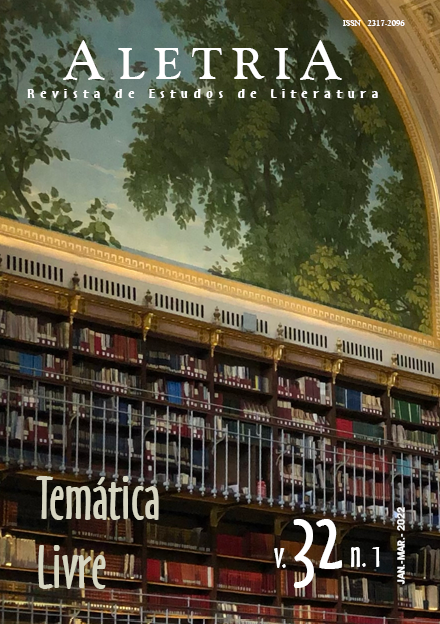Da condição humana
o tema na poesia grega arcaica
DOI:
https://doi.org/10.35699/2317-2096.2022.34239Palabras clave:
poesia grega arcaica, Baquílides, pessimismo, humanidade, mélicaResumen
O artigo discorre sobre a visão grega arcaica acerca do homem e de sua condição, pela qual apreendemos o tradicional pessimismo poético, que, sem ilusões, contempla corajosamente a fragilidade, a limitação e a finitude inerentes à natureza humana que, por elas, distingue-se da dos deuses que, portanto, nela têm o referente necessário para sua superioridade hierárquica no cosmo. Ao fazê-lo, transita por Homero, Hesíodo e Simônides, enfocando a mélica epinícia de Baquílides, especificamente, o Epinício 5, a fim de realçar o tema que ali tem tanto peso quanto o do elogio da vitória atlética: o da condição humana, sobretudo em sua instabilidade da fortuna e limitação do conhecimento.
Descargas
Referencias
ALLEN, Thomas W. (ed.). Homeri Opera: Odysseae I-XII. 2. ed. Oxford: Clarendon, 1975a. t. III.
ALLEN, Thomas W. (ed.). Homeri Opera: Odysseae XIII-XXIV. 2. ed. Oxford: Clarendon, 1975b. t. IV.
BREMMER, Jan. The Early Greek Concept of the Soul. Princeton: University Press, 1983. DOI: https://doi.org/10.1515/9780691219356.
CAIRNS, Douglas L. (introd., ed., coment.). Bacchylides: Five Epinician Odes (3, 5, 9, 11, 13). Cambridge: Francis Cairns, 2010.
CHANTRAINE, Pierre. Dictionnaire Étymologique de la Langue Grecque. Paris: Klincksieck, 1999.
CLAY, Jenny S. Hesiod’s Cosmos. Cambridge: University Press, 2003.
DICKIE, Matthew W. On the Meaning of Ἐφήμερος. Illinois Classical Studies, [s. l.], v. 1, p. 7-14, 1976.
FEARN, David. Bacchylidean Myths. In: AGÓCS, Peter et al. (ed.). Reading the Victory Ode. Cambridge: University Press, 2012. p. 321-343. DOI: https://doi.org/10.1017/CBO9781139017626.021.
FRAENKEL, Eduard. (ed., coment.). Aeschylus. Agamemnon. Oxford: Clarendon Press, 1982. v. II: Commentary on 1-1055.
FRÄNKEL, Hermann. Man’s “Ephemeros” Nature According to Pindar and Others. Transactions of the American Philological Association, [s. l.], v. 77, p. 131-145, 1946. DOI: https://doi.org/10.2307/283450.
HARVEY, Anthony. E. Homeric Epithets in Greek Lyric Poetry. Classical Quarterly, Cambridge (UK), v. 7, n. 3/4, p. 206-223, jul./out. 1957. DOI: https://doi.org/10.1017/S0009838800015287.
HERINGTON, John. Poetry into Drama: Early Tragedy and the Greek Poetic Tradition. Berkeley: University of California Press, 1985.
HESÍODO. Trabalhos e dias. Tradução de Christian Werner. São Paulo: Hedra, 2013.
HOMERO. Ilíada. Tradução de Christian Werner. São Paulo: Sesi: Ubu Editora, 2018a.
HOMERO. Odisseia. Tradução de Christian Werner. São Paulo: Sesi: Ubu Editora, 2018b.
LEFKOWITZ, Mary R. Bacchylides’ Ode 5: Imitation and Originality. Harvard Studies in Classical Philology, Cambridge (M), v. 73, p. 45-96, 1969. DOI: https://doi.org/10.2307/311148.
LEFKOWITZ, Mary R. The Victory Ode: an Introduction. New Jersey: Noyes, 1976.
LESHER, James H. Archaic Knowledge. In: WIANS, William. (ed.). Logos and Muthos: Philosophical Essays in Greek Literature. New York: Sunny Press, 2009. p. 13-28.
LESHER, James H. Early Interest in Knowledge. In: LONG, Anthony A. (ed.). The Cambridge Companion to Early Greek Philosophy. Cambridge: University Press, 1999. p. 225-249. DOI: https://doi.org/10.1017/CCOL0521441226.011.
MACLACHLAN, Bonnie. The Age of Grace: Charis in Early Greek poetry. Princeton: University Press, 1993. DOI: https://doi.org/10.1515/9781400863358.
MAEHLER, Herwig. (ed.). Bacchylides. Carmina cum Fragmentis. 11. ed. Munich, Leipzig: K. G. Saur, 2003. DOI: https://doi.org/10.1515/9783110977332.
MAEHLER, Herwig. (ed., coment.). Bacchylides. A Selection. Cambridge (UK): University Press, 2004. DOI: https://doi.org/10.1017/CBO9780511802386.
MONRO, David B.; ALLEN, Thomas W. (ed.). Homeri Opera: Iliadis Libros XIII-XXIV. 3. ed. Oxford: Clarendon, 1920. t. II.
MUGLER, Charles. La Lumière et la Vision dans la Poésie Grecque. Revue des Études Grecques, Paris, v. 73, n. 344/346, p. 40-72, jan./jul. 1960. DOI: https://doi.org/10.3406/reg.1960.3598.
PAGE, Denys L. (ed.). Poetae Melici Graeci. Oxford: Clarendon, 1962.
RAGUSA, Giuliana. (org., trad.). Lira Grega. Antologia de Poesia Arcaica. São Paulo: Hedra, 2013.
RAGUSA, Giuliana. De Brotos, Vergônteas e que tais: a Imagem de Meleagro no Epinício 5, de Baquílides. Revista Organon, Porto Alegre, v. 31, n. 60, p. 63-83, jan./jun. 2016. DOI: https://doi.org/10.22456/2238-8915.62486.
SULLIVAN, Shirley D. The Wider Meaning of Psyche in Pindar and Bacchylides. Studi Italiani di Filologia Classica, Florença, v. 9, n. 2, p. 163-183, 1991.
WEST, Martin L. (ed., coment.). Hesiod, Works and Days. Oxford: Clarendon, 1982.
WIANS, William. The Agamemnon and Human Knowledge. In: WIANS, William. (ed.). Logos and Muthos: Philosophical Essays in Greek Literature. New York: Sunny Press, 2009. p. 181-198.
Descargas
Publicado
Número
Sección
Licencia
Derechos de autor 2022 Giuliana Ragusa (Autor)

Esta obra está bajo una licencia internacional Creative Commons Atribución 4.0.
Authors who publish with this journal agree to the following terms:Authors retain copyright and grant the journal right of first publication with the work simultaneously licensed under a Creative Commons Attribution Non-Commercial No Derivatives License that allows others to share the work with an acknowledgement of the work's authorship and initial publication in this journal.Authors are able to enter into separate, additional contractual arrangements for the non-exclusive distribution of the journal's published version of the work (e.g., post it to an institutional repository or publish it in a book), with an acknowledgement of its initial publication in this journal.Authors are permitted and encouraged to post their work online (e.g., in institutional repositories or on their website) prior to and during the submission process, as it can lead to productive exchanges, as well as earlier and greater citation of published work (See The Effect of Open Access).









